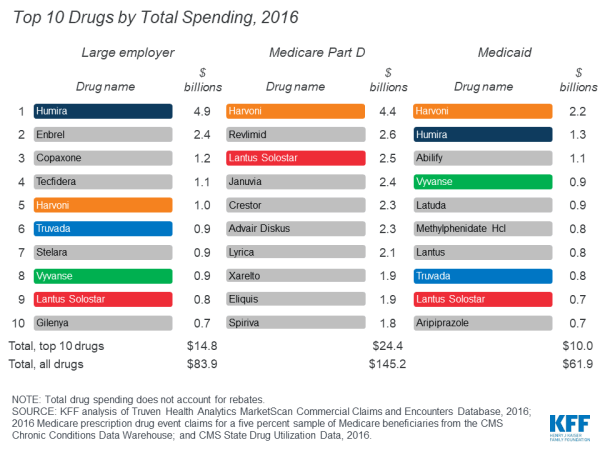
The independent source for health policy research, polling, and news.
New Analysis Compares Prescription Drug Spending and Use Across Large Employer Plans, Medicare, and Medicaid
As policymakers debate how to address the high cost of prescription drugs, a new KFF analysis compares data on prescription drug spending and use across large employer plans, Medicare Part D and Medicaid, and provides context for policy discussions about different approaches to curb rising drug costs that would affect people covered by each of the three major payers.
The data show that private insurers, Medicare and Medicaid account for 82 percent of retail prescription drug spending, while patients paid 14 percent of the cost out-of-pocket. However, the types of individuals covered by these payers varies, from adults 65 and over and younger people with disabilities in Medicare, to low-income children and adults including seniors and people with disabilities in Medicaid, to a comparatively healthier working-age population covered in employer health plans.
Other highlights in the data include:
- Across payers, a small number of drugs account for a disproportionate amount of total drug spending. The top 5 drugs with the highest total spending account for at least 10 percent of total prescription drug spending in large employer plans, Medicare Part D, and Medicaid.
- While some of the same drugs appear in the lists of the top 10 drugs with the highest spending within each payer, there is variation in the ranking of drugs in common and variation in which drugs appear in the top 10 across payers that reflect the different populations covered and their health needs.

- Out-of-pocket drug spending per user among people in large employer plans and Medicare Part D is highest for drugs to treat cancer, multiple sclerosis, and rheumatoid arthritis.
The analysis is based primarily on claims data by payer, which does not account for rebates paid by drug manufacturers to pharmacy benefit managers, insurers, and state Medicaid programs. Rebates differ by payer, and are estimated to be larger for Medicaid than Medicare Part D or private employers.
The analysis is available at both kff.org and the Peterson-Kaiser Health System Tracker.
For more KFF data and analysis on this subject, visit our special resource page on prescription drugs